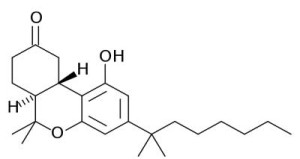Nabilone (Cesamet) Is…..
Nabilone – is a synthetic cannabanoid often used to treat nausea during chemotherapy that is used off-label to treat anorexia, neuropathic pain, sleep disorders, depression, spasticity and more.
The discovery of two cannabanoid receptors in the early 1990’s indicated cannabanoids had the potential to affect many systems of the body including immune cells, sympathetic nervous system, the spleen, adrenals, gastrointestinal tract, the heart, blood vessels, lungs, etc. Our bodies produce cannabinoids naturally and we have as many cannabinoid receptors as opioid receptors.
One of the receptors (CB1 receptor) – widely found in the central nervous system – is responsible for cannabis’s mind-altering effects. The most psycho-active ingredient in cannabis, THC (tetrahydrocannabinol), is one of several compounds that may effect body functioning.
Cannabis has pain and nausea reducing, neuroprotective, antispastic and anti-inflammatory properties. One review suggests cannabanoid drugs may be helpful in many disorders including epilepsy, anxiety, depression, Parkinson’s and Huntington’s diseases,ALS, stroke, glaucoma, and hepatic, renal, intestinal and cardiovascular disorders.
Political issues in the US that have restricted study there have lead to the odd pattern of researchers elsewhere (particularly Canada) participating in clinical trials and US researchers writing review articles plugging cannabanoid drug potential.
Nabilone reduced neuropathic pain, improved sleep and quality of life in diabetes. THC had neuroprotective effects in a Parkinson’s cell culture study. Nabilone improved sleep time, quality of sleep and reduced nightsweats in a PTSD study. A review of cannabanoid effectiveness (including Nabilone) in treating pain concluded “addition to the pharmacological armamentarium for treatment of pain shows great promise.”
Fibromyalgia and Chronic Fatigue Syndrome Doctors Report
Dr. Clauw is high, so to speak, on the use of cannabinoids to reduce centrally mediated (ie brain produced) pain (such as occurs in FM). In a talk he noted how surprised pain researchers are at the extent of the endo-cannabinoid system in our bodies.
Clauw much prefers the use of cannabinoids to opioids and he rued the political factors that put cannabinoids out of the reach of most US researchers. Clauw does not endorse smoking cannabis and notes that strong statistical evidence suggests adolescents smoking cannabis are at risk of developing schizophrenia.
Fibromyalgia and Chronic Fatigue Syndrome Studies
Nabilone improved pain and functional capacity and reduced anxiety in FM in two studies, and improved sleep (but did not effect pain in one).





